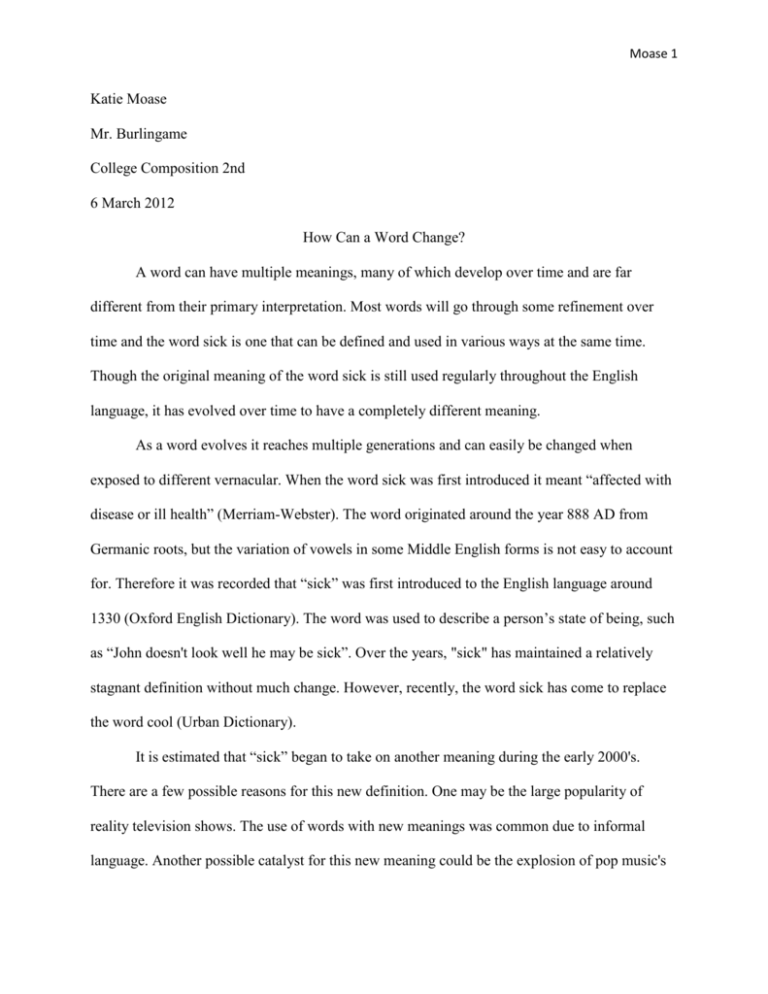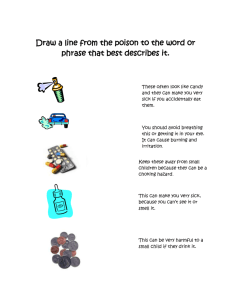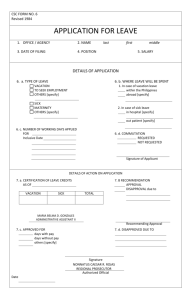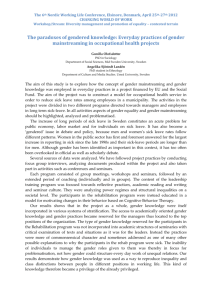Moase Katie Moase Mr. Burlingame College Composition 2nd 6
advertisement

Moase 1 Katie Moase Mr. Burlingame College Composition 2nd 6 March 2012 How Can a Word Change? A word can have multiple meanings, many of which develop over time and are far different from their primary interpretation. Most words will go through some refinement over time and the word sick is one that can be defined and used in various ways at the same time. Though the original meaning of the word sick is still used regularly throughout the English language, it has evolved over time to have a completely different meaning. As a word evolves it reaches multiple generations and can easily be changed when exposed to different vernacular. When the word sick was first introduced it meant “affected with disease or ill health” (Merriam-Webster). The word originated around the year 888 AD from Germanic roots, but the variation of vowels in some Middle English forms is not easy to account for. Therefore it was recorded that “sick” was first introduced to the English language around 1330 (Oxford English Dictionary). The word was used to describe a person’s state of being, such as “John doesn't look well he may be sick”. Over the years, "sick" has maintained a relatively stagnant definition without much change. However, recently, the word sick has come to replace the word cool (Urban Dictionary). It is estimated that “sick” began to take on another meaning during the early 2000's. There are a few possible reasons for this new definition. One may be the large popularity of reality television shows. The use of words with new meanings was common due to informal language. Another possible catalyst for this new meaning could be the explosion of pop music's Moase 2 popularity in the 21st century. As with reality television, pop music used informal language and metaphors in a lot of lyrics. Both of these circumstances could have easily influenced the use of “sick.” In general, people will use words depending on how they hear them being used. This can be explained by simply examining the different geographical locations of the United States. In the Southern United States, a carbonated beverage would be referred to as a “soda”. In the midwest, these drinks are commonly referred to as “pops”. If multiple words can take on the same meaning, it can reasonably be seen that one word could eventually take on multiple meanings. For instance, during an interview, when senior citizen Mary Morris was asked to use “sick” in a sentence, she used the original meaning. “When the seasons change I usually get sick”. However when asking college student Alex Grix on the use of the word sick, his first response was “The back flip this guy did was sick!” Because he is exposed to the slang and original meaning of “sick” frequently he can acknowledge that there are multiple ways to use it but applied it in a way that he hears most often. The significance of this change is that a word once given a negative connotation has become something positive. This isn't necessarily bad for society it just signifies the changes in culture during the 21st century. In fact the slang meaning of “sick” may die out with the generation that coined the term. This occurred with the word “rad”, an abbreviation of radical that meant “awesome”, it became popular in the early 90's and has already died out. The original meaning of “sick” has not been replaced, but has evolved to take on multiple meanings. From describing illness, to associating something as awesome, “sick” has definitely transformed. The English language is like a living organism, adapting to the changing Moase 3 surroundings as time moves forward. Some changes will be permanent, and some will come and go but as time goes on, words will continue to adapt, and outdated words will be lost to history. Moase 4 Works Cited "Sick."Merriam-Webster. Merriam-Webster. Web. 06 Mar. 2012. <http://www.merriamwebster.com/dictionary/sick>. "Discover the Story of English More than 600,000 Words, over a Thousand Years."Home: Oxford English Dictionary. Oxford University Press. Web. 06 Mar. 2012. <http://www.oed.com/> "Urban Dictionary: Sick."Urban Dictionary. Web. 06 Mar. 2012. <http://www.urbandictionary.com/define.php?term=sick>.




